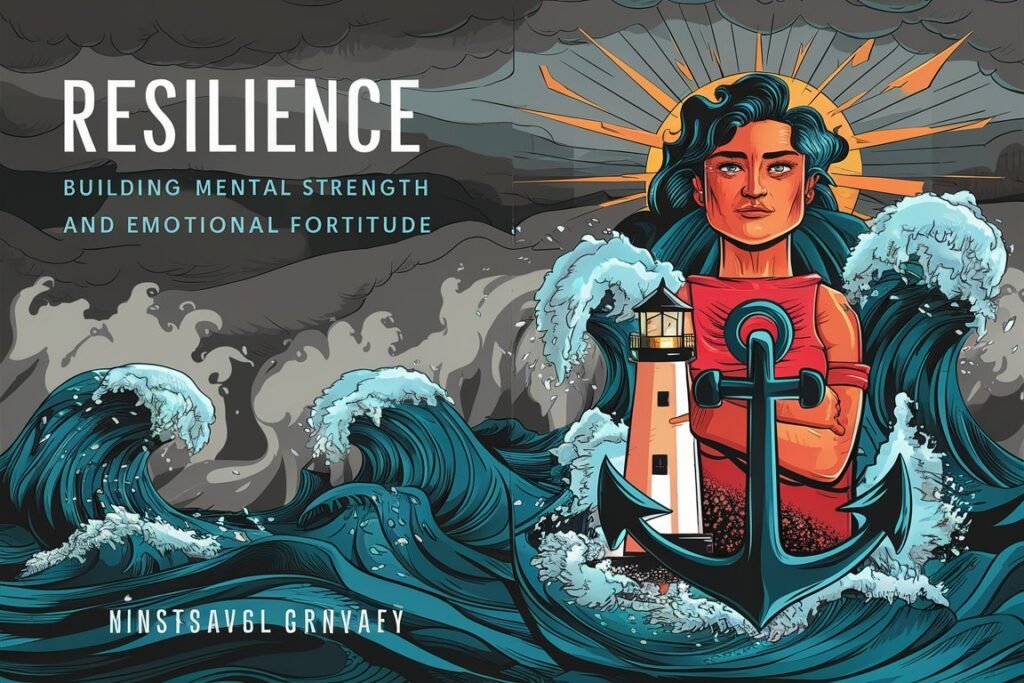Resilience: Building Mental Strength and Emotional Fortitude
Hey there, my young friends! It’s your favorite mental health buddy, Nita Sharda, here to talk about a topic that’s super important for all of us, no matter our age – resilience.
Now, I know that word might sound a little fancy or complicated, but don’t worry – we’re going to break it down and make it easy to understand.
What is Resilience?
First things first, let’s talk about what resilience actually means. Resilience is the ability to bounce back from tough situations and challenges. It’s like having a superpower that helps us stay strong and keep going, even when things get tough.
Think of it like a rubber band – when you stretch it out, it might feel like it’s going to break, but then it snaps back into shape. That’s kind of like resilience – it’s the ability to get through hard times and come out the other side even stronger.
Why Resilience Matters
So, why is resilience so important? Well, life is full of ups and downs, and we all face challenges and setbacks from time to time. Whether it’s a bad grade on a test, a fight with a friend, or a big change in our lives, tough stuff happens to everyone.
But here’s the thing – it’s not the challenges themselves that define us, it’s how we respond to them. And that’s where resilience comes in.
When we have resilience, we’re able to:
- Bounce back from setbacks and keep going
- Find creative solutions to problems
- Stay hopeful and optimistic, even in tough times
- Learn and grow from our experiences
- Build strong relationships and support systems
In other words, resilience is like a superpower that helps us thrive, no matter what life throws our way.
Building Resilience: Tips and Strategies
Okay, so now that we know what resilience is and why it’s so important, let’s talk about how we can build it. Here are some tips and strategies to help you develop your own resilience superpowers:
Develop a growth mindset
One of the most important things you can do to build resilience is to develop a growth mindset. This means believing that you can learn and grow from your experiences, even the tough ones.
Instead of thinking “I can’t do this” or “I’m not good enough,” try thinking “I can learn from this” or “I’m going to keep trying until I get it.”
Remember, everyone makes mistakes and faces challenges – it’s how we learn and grow. So embrace the power of “yet” – instead of saying “I can’t do it,” say “I can’t do it yet, but I’m going to keep working at it.”
Practice self-care
Taking care of yourself is another important part of building resilience. When you’re feeling stressed or overwhelmed, it’s easy to neglect your own needs. But taking time for self-care can help you recharge and stay strong.
Some ideas for self-care include:
- Getting enough sleep and eating healthy foods
- Exercising or moving your body in fun ways
- Spending time with people who make you feel good
- Doing activities that you enjoy, like reading, drawing, or playing music
- Taking breaks and giving yourself permission to rest
Remember, self-care isn’t selfish – it’s an important part of taking care of your mental and emotional health.
Build strong relationships
Having strong, supportive relationships is another key part of building resilience. When we have people in our lives who love and support us, it’s easier to get through tough times.
Some ways to build strong relationships include:
- Being a good listener and showing empathy for others
- Expressing your feelings and needs in healthy ways
- Doing kind things for others and showing appreciation
- Spending quality time with people you care about
- Reaching out for help and support when you need it
Remember, it’s okay to lean on others when you’re going through a tough time. That’s what friends and family are for!

Practice problem-solving
When we face challenges or setbacks, it’s easy to feel stuck or overwhelmed. But practicing problem-solving skills can help us find creative solutions and keep moving forward.
Some problem-solving strategies include:
- Breaking big problems down into smaller, more manageable steps
- Brainstorming different solutions and weighing the pros and cons
- Asking for help or advice from others
- Trying new things and learning from your mistakes
- Celebrating your successes, no matter how small
Remember, every problem has a solution – sometimes it just takes a little creativity and persistence to find it.
Cultivate a positive outlook
Finally, cultivating a positive outlook can be a powerful way to build resilience. This doesn’t mean ignoring or denying tough feelings – it’s important to acknowledge and process those too. But it does mean looking for the good in every situation and finding things to be grateful for.
Some ways to cultivate a positive outlook include:
- Focusing on your strengths and accomplishments
- Looking for the silver lining in tough situations
- Practicing gratitude and appreciating the good things in your life
- Surrounding yourself with positive, supportive people
- Using positive self-talk and affirmations
Remember, our thoughts and attitudes have a big impact on how we feel and how we cope with challenges. By choosing to focus on the positive, we can build our resilience and stay strong, no matter what life throws our way.
Putting It All Together
Whew, that was a lot of information! But I hope you’re feeling more empowered and equipped to build your own resilience superpowers.
Remember, resilience isn’t about being perfect or never facing challenges. It’s about having the tools and strategies to bounce back and keep going, even when things get tough.
So let’s recap some of the key strategies for building resilience:
- Develop a growth mindset and believe in your ability to learn and grow
- Practice self-care and take care of your physical, mental, and emotional health
- Build strong, supportive relationships with others
- Practice problem-solving skills and look for creative solutions
- Cultivate a positive outlook and focus on the good in every situation
By incorporating these strategies into your daily life, you can build your resilience muscles and become a mental and emotional superhero!
And remember, building resilience takes time and practice. It’s okay to have tough days or to need extra support sometimes. The important thing is to keep trying, keep learning, and keep growing.
So keep shining your bright light, my young friends. The world needs your resilience and your strength. And if you ever need a little extra encouragement along the way, just remember – your mental health buddy Nita is always here to cheer you on!
Until next time, stay strong and keep building those resilience superpowers. You’ve got this!













1 Comment